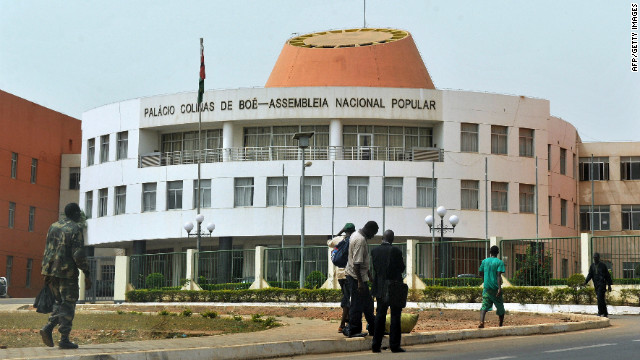 Residents walk past parliament in Bissau last month. Military forces are in the streets of the capital Friday.
Residents walk past parliament in Bissau last month. Military forces are in the streets of the capital Friday.
A group of Portuguese-speaking countries condemned a coup that has roiled the tiny nation of Guinea-Bissau, plunging the African country into more chaos after nearly four decades of instability.
Foreign ministers from the Community of Portuguese-Speaking Countries group discussed the coup at a gathering in Lisbon, Portugal, on Saturday.
Guinea-Bissau is a member of the group, which also includes Portugal, Angola, Mozambique and Brazil.
Coups and coup attempts are common in Guinea-Bissau since it won its independence from Portugal in 1974.
In the latest coup, soldiers took Acting President Raimundo Pereira and Prime Minister Carlos Gomes Jr. into custody Thursday night, sparking international condemnation.
Both leaders are well and alive, said Daba Naualna, a spokesman for the army's chief of staff. He said a group called the military command was behind the arrests, though it was unclear who its members are.
Leaders of the nation's armed forces have taken control of the nation to ensure stability, according to the spokesman.
"The (army chief of staff) thinks, for the sake of the country, that power cannot fall into the streets and decided to have (the military) play its part in seeking solutions with the political class to resolve this crisis," he said.
Military leaders have said they have no desire to "stay in power" and have asked political parties to send ideas on what to do next by Sunday, the spokesman said. A meeting is expected to take place Sunday to discuss the proposals.
World leaders condemned the coup, which occurred just before the second round of a presidential election set for April 29.
The African Union, the United Nations and the United States called for a return to civilian rule and demanded the release of the leaders.
U.S. State Department spokesman Mark Toner said the United States was "deeply concerned" about the safety of residents.
"We urge all parties to put down their weapons, release government leaders immediately, and restore the legitimate civilian leadership," Toner said.
"We remain deeply concerned about the safety of the country's interim president, senior figures, and others who may be put in harm's way because of these actions," the White House said in a statement.
In a statement, the military command said the revolt was in response to a "secret deal" between the government and Angola.
This "deal" was drawn up to allow Angolan troops in the country to attack Guinea-Bissau's military, a communique from the group said.
This group says the acting president and the prime minister signed the deal and also accuses the African Union -- whose rotating presidency is currently held by Angola -- of supporting intervention by Angolan forces.
Guinea-Bissau's history has been marked by several military coups, and these conflicts have ravaged its infrastructure and economy, leaving it among the poorest in the world.
The nation's first round of voting in a presidential election was held in March, and campaigning for the second round was about to begin. The election was prompted by the death of the incumbent Malam Bacai Sanha in January after a long illness.
Residences of the prime minister and some government ministers were looted, witnesses said. Public media outlets are under the control of the army and are regularly broadcasting statements from the military, witnesses said Friday.
Angola, also a former Portuguese colony, issued a statement last week saying it would unilaterally withdraw its troops. A number of Angolan troops are in the country to help reform the country's armed forces, Angola said.
Sanha had become president in September 2009 after the assassination of his predecessor.
Despite his coming to power in what international observers deemed a fair and peaceful election, his tenure was marked by turmoil among the country's military and political leadership.
To date, no democratically elected president of the country has served a full, five-year term.
Aucun commentaire:
Enregistrer un commentaire
welcome